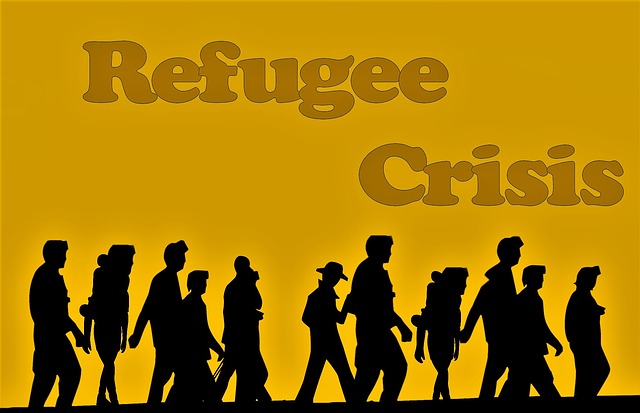About 60 million people around the globe have been forced to leave their homes to escape war, violence and persecution. The majority have become Internally Displaced Persons, meaning they fled their homes but are still in their own countries. Others, referred to as refugees, sought shelter outside their own country. But what does that term really mean? Benedetta Berti and Evelien Borgman explain.
Watch
Glossary
- persecution – unfair or cruel treatment over a long period of time because of race, religion, or political beliefs
- to flee (Past Simple, Past Participle – fled) – to escape from sth or sb
- to seek (Past Simple, Past Participle – sought) – to go in search of
- well-founded – based on excellent reasoning, information, judgment
- drought-stricken – affected by drought (a long period of time when there is little or no rain)
- perilous – very dangerous
- unbearable – unendurable; intolerable
- xenophobia – fear and hatred of strangers or foreigners or of anything that is strange or foreign
Answer the questions:
- What does it mean to become an internally displaced person?
- How do we define a ”refugee”?
- What does the situation of children not being accompanied by an adult make them vulnerable to?
- What’s the difference between the terms ”migrant” and ”refugee”?
- Why do refugees sometimes need to entrust their lives to smugglers?
- What are refugee camps intended to be?
- Why does a displaced person have to apply for asylum?
- What are the duties of host countries towards refugees?
Practice Makes Perfect
Replace the words in bold in the article with the ones below:
lending a hand hits close to home to date fled facilitated
waiving full-fledged temporary seeking lodging
How Companies Are Aiding the Ukrainian Relief Efforts, From Supporting Refugees to Funding the Armed Forces
The war in Ukraine is now a 1. full-grown humanitarian crisis.
The United Nations estimates that more than 1.7 million refugees have 2. got away from Ukraine in the first 11 days of the conflict. They’re going to neighboring countries like Poland, Romania, Moldova, and Hungary, which have largely opened their borders to those 3. looking for safety.
While different nation’s have necessarily stepped up to help, businesses are also 4. helping out. Here are a few ways companies are offering donations, a place to sleep, or other acts of charity to help Ukrainians in need:
Offering 5. short-term housing
Airbnb announced on February 28 that it would provide temporary housing for up to 100,000 Ukrainian refugees, with the stays funded by Airbnb and supported through donations to the company’s nonprofit arm, Airbnb.org. (…) The company confirmed that it was 6. relinquishing all guest and host fees on the bookings, so it was not profiting on the crisis.
Donating profits to charity
A straightforward way other businesses are getting involved is by donating to relief efforts in Ukraine, by matching employee donations, devoting profits to a cause, or making a charitable contribution directly as a company. (…) Baker Creek Heirloom Seed Company (…) raised $1.6 million, in its largest charitable effort 7. up until the present time. As founder and owner Jere Gettle wrote on Baker Creek’s website, this cause 8. involes him directly: His great-grandparents, German immigrants to Odessa, fled Ukraine because of Soviet aggression in the early 20th century.
Setting up charitable funds
The San Francisco-based expert-on-demand company JustAnswer, which has about a quarter of its workforce in Ukraine, set up a crisis fund, which will go toward the Ukrainian armed forces and refugees, with donations 9. made easy by the Ukrainian charity Lviv ІТ Cluster. (…)
Evacuating employees
The Tel Aviv-based website builder Wix has about 950 employees based in Ukraine, which led CEO Nir Zohar to take serious action, he told The Washington Post. An internal team of about 20 Wix employees worked together to book travel and 10. residence to help about 500 Ukraine-based Wix employees and their families to flee the country amid the conflict, and is in close contact with the workers who remain in Ukraine. (…)
Key: 1. full-fledged; 2. fled; 3. Seeking; 4. lending a hand; 5. temporary; 6. waiving; 7. to date; 8. hits close to Home; 9. facilitated; 10. lodging
In order to read the whole article, go to: https://www.inc.com/rebecca-deczynski/how-companies-are-helping-ukraine-charity-donations.html
Discuss
- Are there many refugees in your country?
- What’s the difference between political refugees and economic refugees?
- What do you think it’s like to suddenly lose your home and way of life and end up in a refugee camp?
- Do refugees bring problems to the countries they go to?
- Can one be a refugee in his/her own country?
- Do you give money to refugee charities?
Explore it more to create your own teaching-learning experience!
Ukrainian Refugees’ Journeys Have Just Begun
On arriving in Poland, people fleeing the Russian invasion weigh where to go next.
Read:
https://www.newyorker.com/magazine/2022/03/21/ukrainian-refugees-journeys-have-just-begun
(2710)






